Interview with Alex Neish, Editor of Jabberwock and Sidewalk
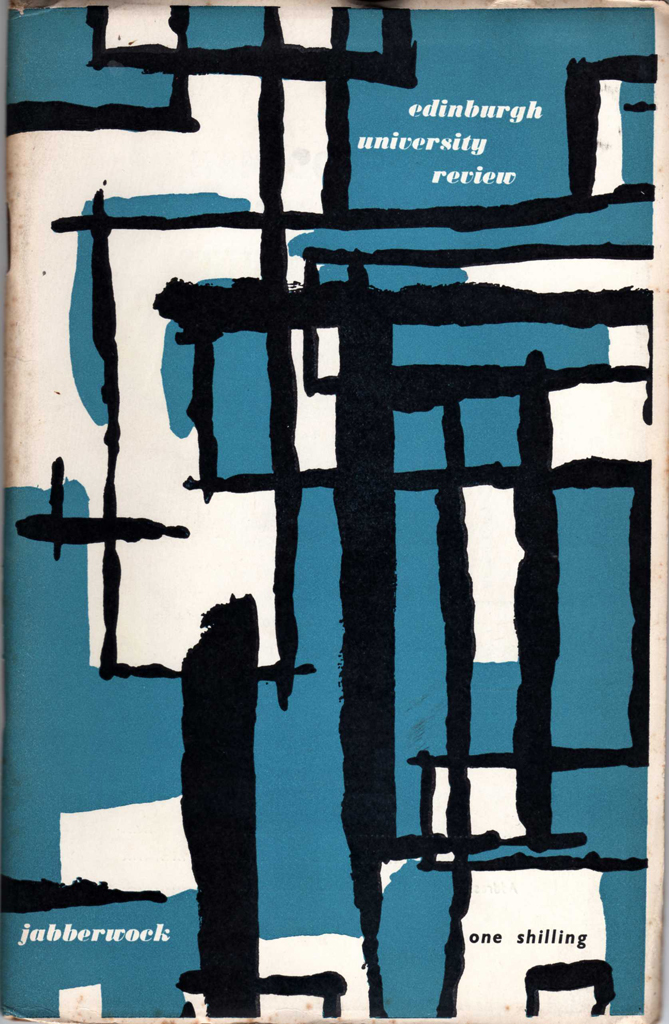

Well, the internet certainly can lead you to some interesting and unexpected places. After seeing him mentioned on RealityStudio and on Nakedlunch.org, I recently became intrigued by Alex Neish, a Scotsman who put out an issue of the Edinburgh University Review entitled Jabberwock in 1959 with the superb first chapter of Naked Lunch in it, And Start West.
Edinburgh is only 25 miles from my old home town of Falkirk, and this proximity to an historical literary event 10 years before I was born started me wondering who exactly Neish was, whether he had published other stuff, what had happened to him, etc. So I started a shot-in-the-dark net search, and quickly found out there were no interviews with the man anywhere I could see, and very little info about him out there either. It was frustrating. Who was this young man who had been publishing Burroughs and Ginsberg and Corso and Kerouac a half century ago?
There were mentions of Jabberwock in 1959 and the two issues of Sidewalk, the 1960 literary quarterly he put out after Jabberwock. Then there was nothing much mentioned until 1966 and an appearance in a book called New Writers V, which I supposed could have been him, especially as being published by literary publishers Calder & Boyars. But then after that, bearing the odd mention of the name Neish in some genealogical search here and there… nothing.
Until…
In 2006, a full four decades after the trail went cold, I chanced a cross a reference to a work entitled The Secrets of Old Haddington by… Alex Neish. It was a long shot, but I looked up where Haddington was. East Lothian. Aha, I thought to myself (cos you can’t think to anybody else, unless you’re telepathic), that’s the Edinburgh area. So I fired off an email to the Scottish historical website with the Neish mention on it, asking if they had any idea whether their writer was the one I was looking for and how to get in contact with him if he was. I got back an email the next day from the man himself: “After going into South American exile for 40 years, I am now retired in Barcelona.”
Takes a Scotsman to find a Scotsman.
I emailed Alex some questions about his unexplored historic transatlantic contribution to Scottish literature, and he graciously answered them below.
What is your educational background and how did you come to writing?
I was educated at various schools across Scotland as my father was in estate management and so we moved around a lot. At Dumfries Academy I had a marvelous primary teacher who encouraged me to read. Even when we moved we maintained contact and she would send me small gifts to be spent on books she recommended. By the time I hit the University of Edinburgh at 17 she had made me familiar with the great Russian novelists. When we lived at a town called Langholm — where Hugh MacDiarmid, later to become the leader of the Scottish Renaissance Movement, was born — I would visit the local Library. It had a tray of romantic trash that was all the locals wanted to read. On the top shelves were the complete works of Dickens and Thackeray, which I devoured during my vacations from school on the other side of the county. All of this formed my literary influences.
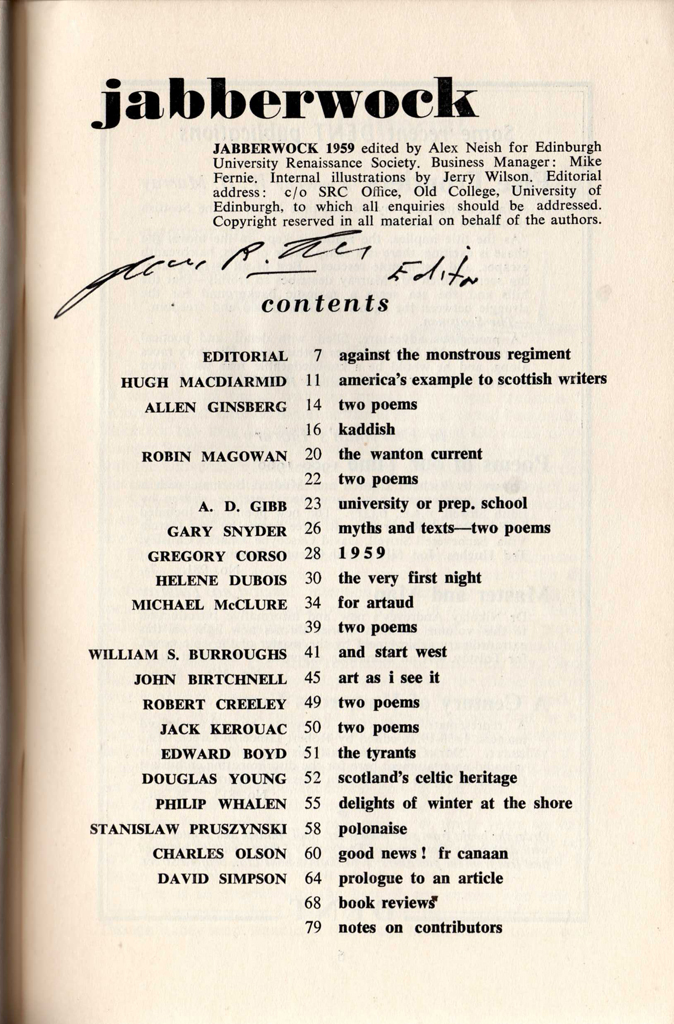

How did you come to be the editor of Jabberwock?
Jabberwock was an introspective political and literary magazine that had been going irregularly since the early 1950s. In the late 50s and early 60s I formed part of a small group that ran all the student publications and was asked to take it over. I edited around 4 issues before deciding to do the American issue in Autumn 1959. This effectively killed it off and then led to Sidewalk.
How many copies did you print? Did it sell well?
I do not remember how many copies we printed. I think it was around 500-750. It targeted people who could see further than Edinburgh Castle and university students who theoretically had more open minds. It sold at 6d, which was then a shilling in those days.
What was your publishing agenda with the Review? Did you publish some of your own writing in it?
I published in it the odd piece of my own — including some under pseudonyms if I was short of copy. The contents were those I liked and thought had something to offer.
What was the state of Scottish writing at that time?
It was very introverted. Trocchi had not been recognised as the most important writer of the last 50 years — nobody had shown such ability since Lewis Grassic Gibbon in a completely different context. Scottish literature was still in the mists and for minorities. I still find it amazing that I was living in Edinburgh at the same time as that genius Sorley MacLean and knew nothing about him. He was not recognised in Scottish Renaissance circles which just about sums up their vision.
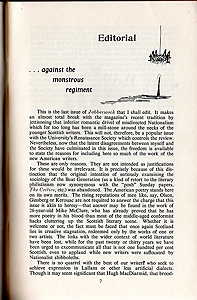

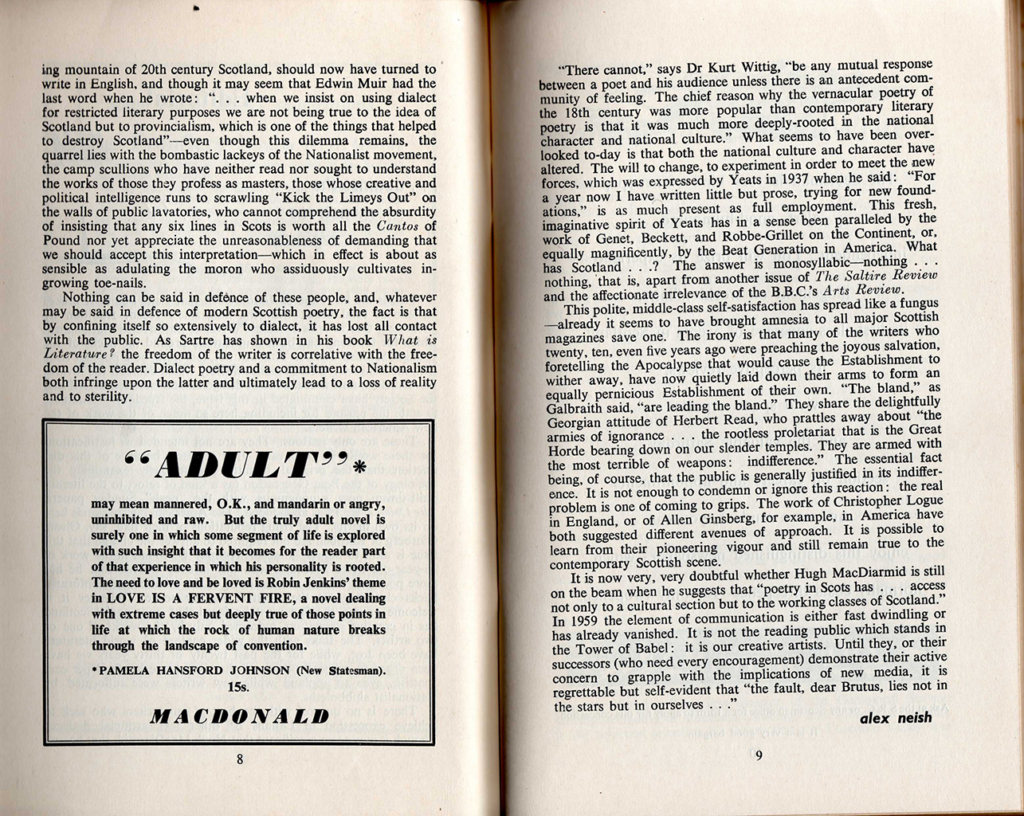

How did you first hear of the Beats?
I honestly do not remember how I first heard of the Beats but I became an enthusiast. It was probably when I picked up isolated copies at an Edinburgh bookshop called The Paperback run by a friend in George Square. It had a rhino head outside. It was owned by an American, Jim Haynes, and he stocked “advanced” literature. Many came to believe he was actually a CIA agent financed to detect “dubious” elements amongst the Americans who flooded to Edinburgh University in those days. He had all the Beat works. We even had Howl on the wall of our bathroom in Edinburgh!
How did you contact them?
I think it was Allen Ginsberg who put me into contact. I do not think it is appreciated what a selfless missionary he was for the cause.
How did you end up publishing the Ginsberg-named first chapter of Naked Lunch in your 1959 American issue? [It was Allen Ginsberg who provided the name “And Start West” for the chapter of Naked Lunch published in Jabberwock. — Ed.]
It was sent to me by Ginsberg. I assumed he had Burroughs’ OK to publish though this later turned out not to be the case. Anyway we were able to sort that out.
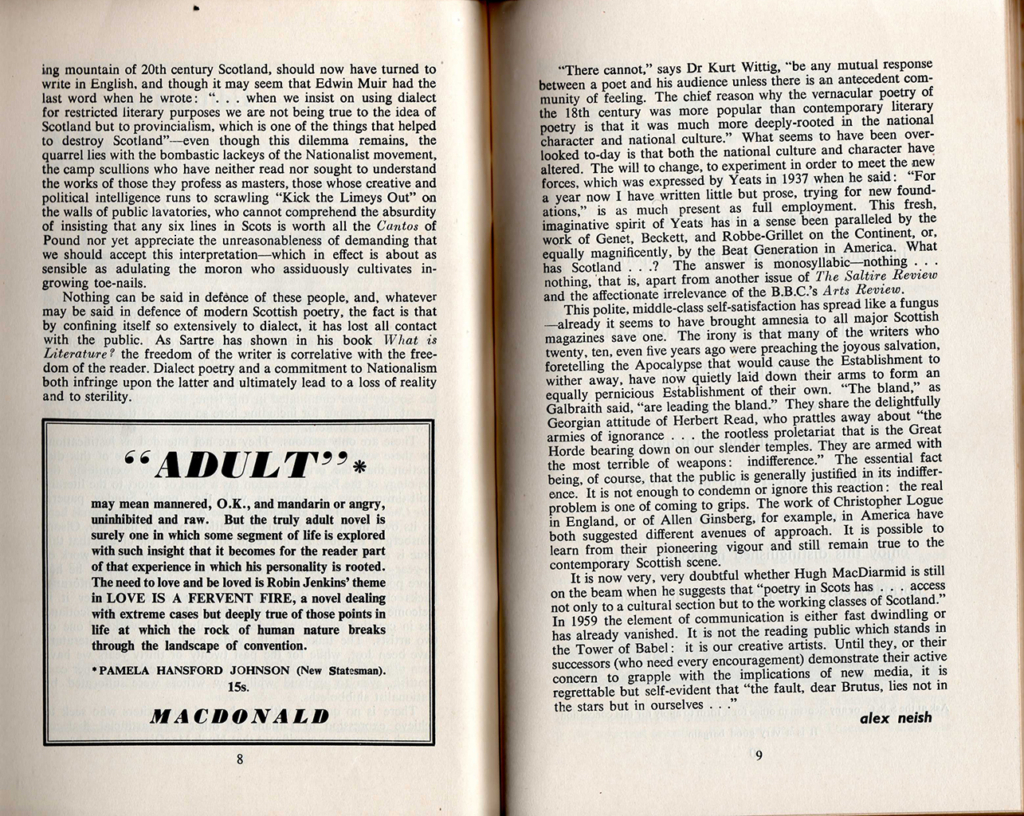

You wrote to me that Burroughs thought that you had pirated the chapter of Naked Lunch and wrote you an angry letter about it, then it all blew over when he learned Ginsberg had sent it. How did he learn of Jabberwock‘s inclusion of his chapter?
I have no idea how Burroughs heard about the publication. I presume one of the many other Beat writers included in the edition may have mentioned it to him.
Can you remember what you thought when you first read the first chapter of Naked Lunch? What did you think of the finished book?
I found it very exciting as I had been bogged down in Scottish prejudice and provincialism. The finished book, however, was uneven but — as they say — a “a ray of light.”
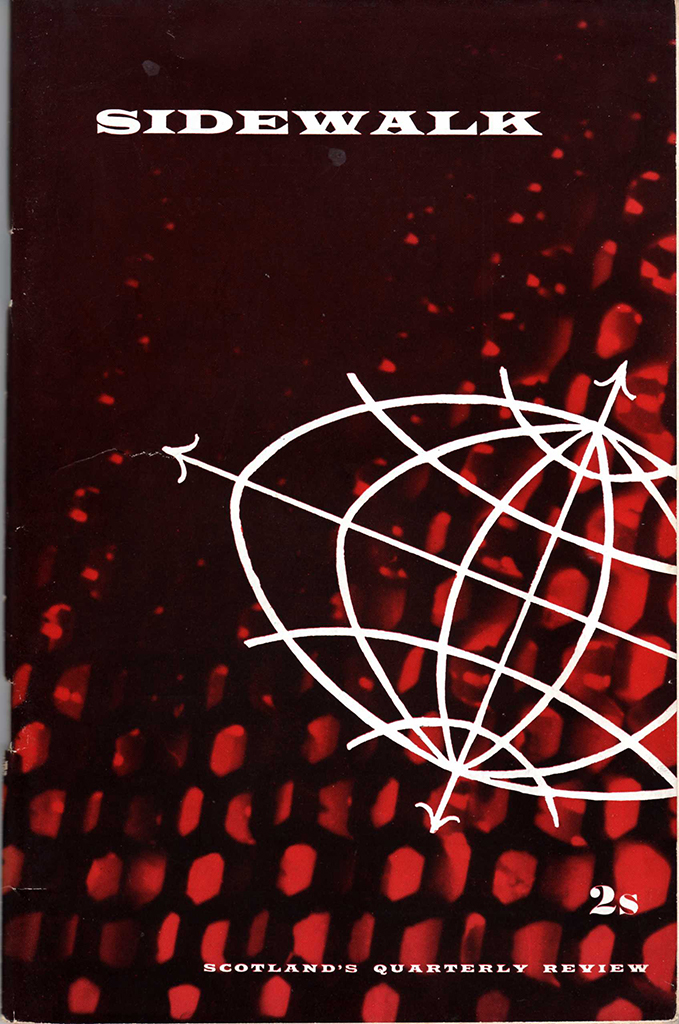

You told me that the American issue of Jabberwock quite deliberately ended the life of the magazine because you thought it had become stale and a self-admiring showcase for traditional Scottish poets like Hugh MacDiarmid, Norman MacCaigand Sydney Goodsir Smith (who was from New Zealand, but wrote in Scots). What was it about their writing you disliked?
I did not wish to kick against their writing. I just viewed it as being a limited vision of modern literature. Some of the early poems of MacDiarmid and Goodsir Smith were polished works but with their advancing age their writing deteriorated. MacGaig was outstanding as a writer and as a human being.
What was the reaction to the American issue of Jabberwock, both in Scotland and abroad?
The audience reaction was very favourable. Press reaction was largely hostile but that is probably par for the course.
You published two issues of a literary magazine in 1960 entitled Sidewalk, which had contributions by the likes of Burroughs, Alain Robbe-Grillet, Ian Hamilton Finlay, Allen Ginsberg, Charles Olson, Robert Creeley and Edwin Morgan. Was this an organic growth of your American issue of Jabberwock? What was your publishing agenda with Sidewalk?
Sidewalk grew from the American Jabberwock. I simply picked the writers I liked. It had to be financed by sales and advertising which was a constant battle. I decided it was time I concentrated on terminating my M.A. LL.B. degrees. I freelanced for newspapers like The Scotsman Group and The Manchester Guardian to keep the wolves from the door and worked as Deputy Editor of a Scottish business magazine when I left university. In 1962 I decided to leave Scotland, which culturally, politically, and economically was stifling and moved to join an international business group headquartered in Buenos Aires. While there I was asked by The Guardian to do long interviews with Jorge Luis Borges, Eduardo Mallea, and the publisher Victoria Ocampo — all of whom at that time were practically unknown in the UK.
I understand the third issue of Sidewalk was suppressed. Is this correct?
No it was not suppressed. There was no Sidewalk 3. I had already left the country and no one appeared to carry it on.
What happened to all your manuscripts from this time?
The American manuscripts were typescripts. The Scottish manuscripts I sold to an English dealer for peanuts to recover some of my own expenditure.
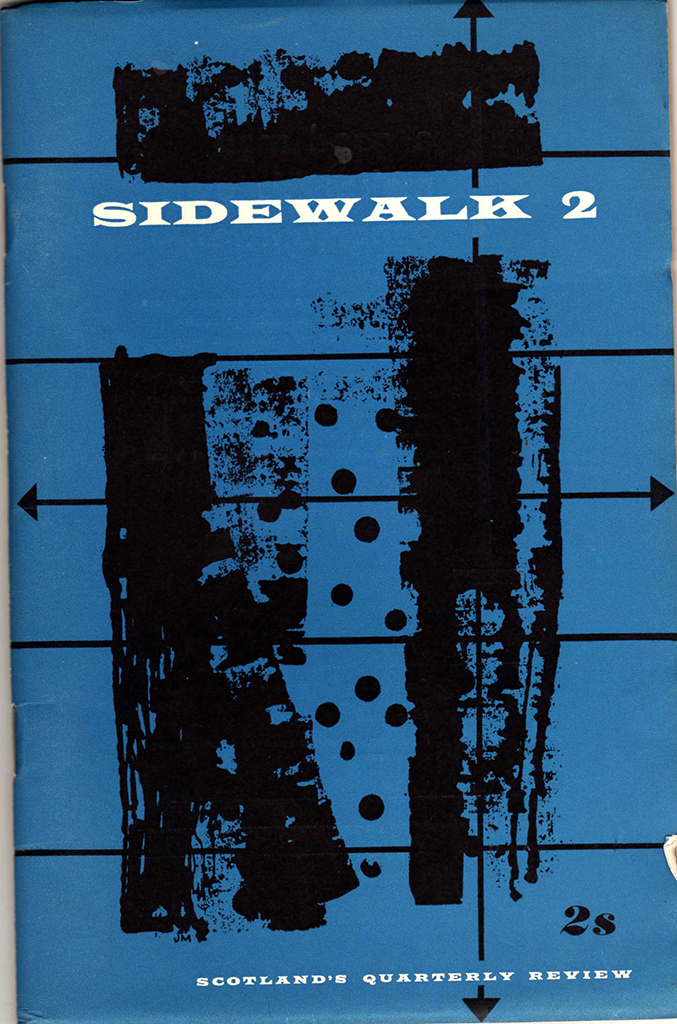

You were friends with Alexander Trocchi. How did you first meet him?
We were very friendly with John Calder and his then wife Bettina and when visiting London would stay with them. A frequent guest was Sam Beckett who was charming and ordinary — and had a great fascination with bicycles. I persuaded John to publish Robert Creeley and then Alexander Trocchi whom we had met in Edinburgh after he jumped bail (financed by Norman Mailer who agreed) and escaped to Canada where he caught a fishing boat to Aberdeen. This was Cold Turkey. He stayed with us in our Edinburgh flat but soon was back on drugs and destroying himself. Before that once we went out to Milne’s Bar where MacDiarmid was holding court. [Milne’s Bar was a famous Edinburgh pub historically frequented by poets and writers. — GR] I introduced Trocchi to him and the hostility was immediate. MacDiarmid as always had too much to drink, had never read anything by Trocchi, and soon was calling him “an illiterate cunt.” Trocchi looked down at him and said simply “You have a peculiar sense of gender.”
In London Trocchi hit the drugs seriously. What he could get on prescription was insufficient and he needed more money. John Calder appreciated his literary importance and was continuously pressing Trocchi to write another book. Sadly Trocchi was no longer capable but he told Calder he was working on one. Pressed for details he would only say enigmatically it was “The Great Book.” This went on for 2-3 years. At one point visiting London from Argentina we ran into the emaciated figure of Trocchi with his Russian fur hat and his carved walking stick walking down a street. We chatted and he said he was incapable of writing anything and now survived selling stamps. He was dead but did not know it — but he generously was to send me the missing copies to complete the run of the brilliant Merlin magazine he had edited in Paris — and where he had published Beckett and other major writers then unrecognised. I do not think Trocchi allowed the fact that Burroughs was also a drug addict to cloud his literary views.
Why did you not publish Trocchi?
Simply because he was not writing anything at the time. He had dried up after his drug abuse so I devoted myself to getting his 2 novels published in the UK and publicising his work.
You wrote to me that Trocchi was “far more important than Irvine Welsh.” I would agree with this. I met Welsh at the Edinburgh International Film Festival in 2001 and he said that Young Adam was “a fucking great book, it’s jist aboot this cunt on a barge.” Have you read any of Welsh’s work? Can you see any influence?
No, I see no Trocchi influence in Welsh — but I do not think Welsh would have been possible without Trocchi.
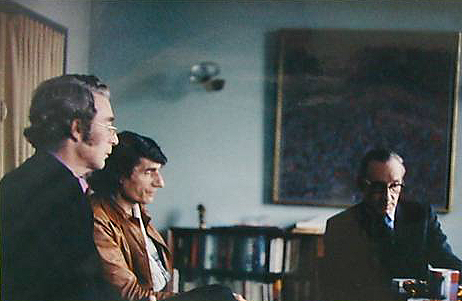

Gysin, Trocchi, and Burroughs by Allen de Loach
Are you aware of any of the work of contemporary Scottish writers (Alan Warner, A.L. Kennedy, Laura Hird, Alan Bissett, etc)?
The only one I have read is Warner whom I considered quite brilliant, a real torchbearer.
Did you attend the 1962 International Writers’ Conference in Edinburgh?
No — I had already left the country.
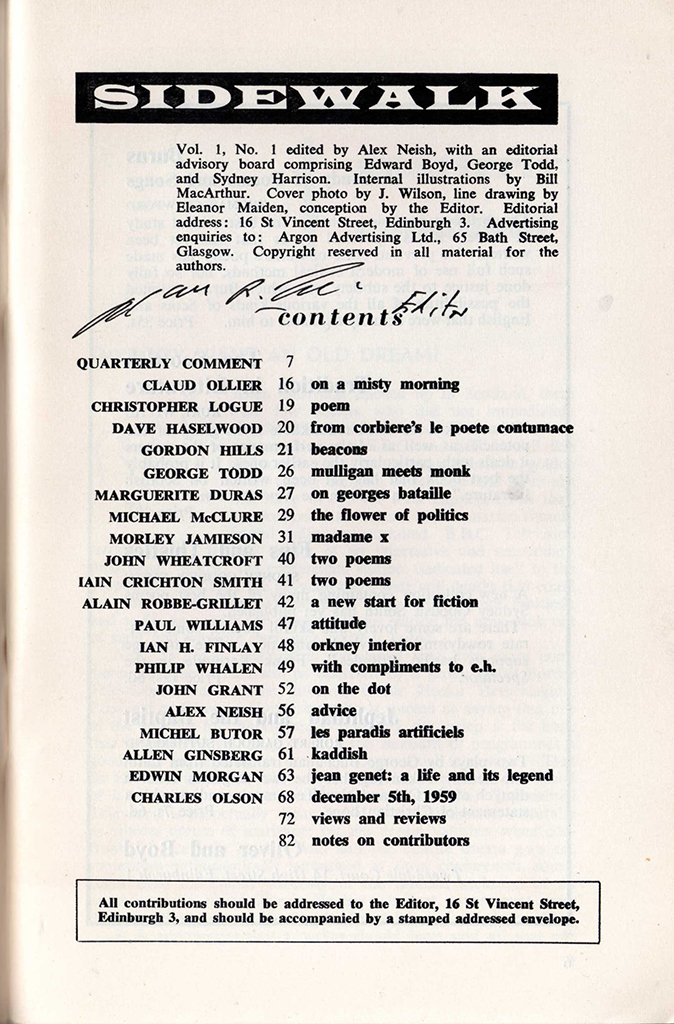

Only the cut-up period, which I thought an aberration.
In 1966 you were published in New Writers V by Calder & Boyars, alongside Daniel Castelain and Nazli Nour, with a short novel entitled Before The Undertaker Comes. How did you come to be published by this company and how was this book received?
I think it was well enough received — but not to the extent that it encouraged me to continue as a novelist.
When researching your history on the internet, there don’t seem to be (m)any mentions of you from 1966 to 1997, when you published the non-fiction volume An Introduction to British Pewter which, it has to be said, is a vastly different word-direction from the one you started out in. What were you doing in the three-plus decades between the volumes?
I was the first non-family Director of one of the top 3 commodity trading companies in the world, controlled from South America. This involved continual international travel for long periods.
You are an acknowledged expert on British Pewter. The Shakespeare Birthplace trust has the 16th century Harvard House at Stratford-on-Avon which houses your collection from Roman times through to the 20th century, and it’s regarded as being the best in the world. Please tell me a bit about this interesting digression from your literary roots.
I just developed a fascination with pewter and began collecting it in the 60s. It became something permanent in the world of hyper-inflation of 40% a month, and the terrorist murder in Argentina of 5 fellow executives and friends. I was fortunate to count as good friends in the pewter world the two leading collectors on both sides of the Atlantic. As you say my Harvard House collection is the greatest in the world. Here in Barcelona I have another museum in the 12th century Sinagoga Mayor, which I gifted. I had built up a collection of pewter Judaica because of the quality of the design and it seemed the indicated place to keep it all together.
Why did you disappear from the conventional literary scene? Do you still write fiction these days? Would you ever want to return to the fictional writing world?
No, I no longer write fiction and have no desire to return to it.
*
Alex Neish interviewed by Graham Rae and published by RealityStudio on 13 April 2009. Photograph of Gysin, Trocchi, and Burroughs by Allen de Loach (reproduced with permission). For more photographs of Burroughs, Trocchi, et al, see lisweetlouon ebay.com.

Now having lived abroad for more than 60 years, I’ve learned about Scottish writings as a teenager in the 1950s – at the knee of my friend, the late Robert Curran, SNP National Secretary in Glasgow. Many young Scots were driven to inspire our traditions then; the staff at Glasgow Calder Street Library including my search ! Many other young Scots’ used Robert’s inspirations, and it was not surprising when “peace songs” included those about those calling for the call to remove the guns held at East Kilbride armoury – those based upon Robert’s fear that the arms might be use by cadets against demonstrators!
When the police discovered our ‘gun dump’ and arrested Bill Brown (one of us), Robert told me that he’d had been given from advice from within the SNP: you could expect to be put away for some years. He suggested considering that I too could going abroad.
We stayed in touch in post – using codes! He had found a position in a religious for youth in New York. I told Robert of my position in Germany – where I was bemused by free folk songs! Then US military agencies offered me work in America, including college opportunities that would never been offered me if I’d remained in Scotland; it was in American municipal studies that I was able to study (and enjoy) serious Scottish song. Since then I have had opportunities in New Zealand. I’m told that – if I wanted to back to Scotland – it would be risky…! If a risked, what would it be worth? I’ve had a good try (read about it in RETIRED TERRORIST)! Scotland has seemed to by satisfied with English dictation. I never could be!